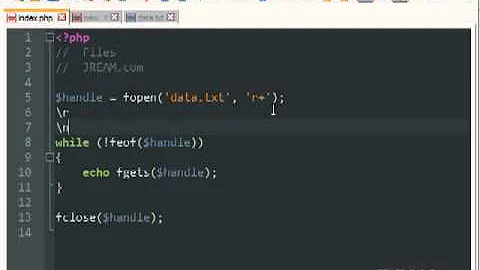PHP cURL vs file_get_contents
Solution 1
file_get_contents() is a simple screwdriver. Great for simple GET requests where the header, HTTP request method, timeout, cookiejar, redirects, and other important things do not matter.
fopen() with a stream context or cURL with setopt are powerdrills with every bit and option you can think of.
Solution 2
In addition to this, due to some recent website hacks we had to secure our sites more. In doing so, we discovered that file_get_contents failed to work, where curl still would work.
Not 100%, but I believe that this php.ini setting may have been blocking the file_get_contents request.
; Disable allow_url_fopen for security reasons
allow_url_fopen = 0
Either way, our code now works with curl.
Solution 3
This is old topic but on my last test on one my API, cURL is faster and more stable. Sometimes file_get_contents on larger request need over 5 seconds when cURL need only from 1.4 to 1.9 seconds what is double faster.
I need to add one note on this that I just send GET and recive JSON content. If you setup cURL properly, you will have a great response. Just "tell" to cURL what you need to send and what you need to recive and that's it.
On your exampe I would like to do this setup:
$ch = curl_init('http://api.bitly.com/v3/shorten?login=user&apiKey=key&longUrl=url');
curl_setopt($ch, CURLOPT_RETURNTRANSFER, 1);
curl_setopt($ch, CURLOPT_SSL_VERIFYPEER, 0);
curl_setopt($ch, CURLOPT_HTTPAUTH, CURLAUTH_BASIC);
curl_setopt($ch, CURLOPT_CONNECTTIMEOUT, 5);
curl_setopt($ch, CURLOPT_TIMEOUT, 3);
curl_setopt($ch, CURLOPT_HTTPHEADER, array('Accept: application/json'));
$result = curl_exec($ch);
This request will return data in 0.10 second max
Related videos on Youtube
Salvador Dali
I am a Software Engineer in the Google Search Growth team. I use Tensorflow and TFX to analyze search data and Go to write data pipelines. This is my personal profile which has absolutely nothing to do with my employer.
Updated on August 22, 2020Comments
-
Salvador Dali almost 4 years
How do these two pieces of code differ when accessing a REST API?
$result = file_get_contents('http://api.bitly.com/v3/shorten?login=user&apiKey=key&longUrl=url');and
$ch = curl_init('http://api.bitly.com/v3/shorten?login=user&apiKey=key&longUrl=url'); curl_setopt($ch, CURLOPT_RETURNTRANSFER, true); $result = curl_exec($ch);They both produce the same result, judging by
print_r(json_decode($result))-
 Admin almost 12 years
Admin almost 12 yearscURLis capable of much more thanfile_get_contents. That should be enough. -
David Gilbertson almost 11 yearsFWIW there's little difference with regards to speed. I've just finished fetching 5,000 URLs and saving their HTML to files (about 200k per file). I did half with curl and half with file_get_contents as an experiment and there was no discernible difference.
-
 Chris Strickland over 9 yearsIt is possible to send post data with file_get_contents, as long as you are using a version that supports stream context.
Chris Strickland over 9 yearsIt is possible to send post data with file_get_contents, as long as you are using a version that supports stream context.
-
-
poke almost 12 yearsTo stay within that metaphor, note that cURL is a powerdrill with a complicated drill chuck that requires you to know it pretty well to actually change it (read: setting cURL options is a bit tedious, but allows for doing anything you want).
-
 velop over 10 years
velop over 10 yearsfile_get_contentsallows also to set the context, which means you can set the header fields as you like. -
Costa over 10 yearsYes,
file_get_contentsrequiresallow_url_fopento be truthy. -
frustratedtech over 10 yearsYes, many hosting companies are disabling
file_get_contents()due to many exploits that are known to use the function. cURL is the function people should be using in code now. -
rdlowrey about 10 years@frustratedtech What "exploits" are these?
-
fritzmg about 9 yearsHosting companies disable
allow_url_fopenbecause they kind of mistake it forallow_url_include.allow_url_fopenandfile_get_contentsare fine to use. -
 vr_driver almost 9 years
vr_driver almost 9 years -
rdlowrey almost 9 years@vr_driver those links have nothing to do with
file_get_contents() -
Markus Köhler almost 9 yearsand as addition to @velop's comment, through the stream context it is also possible to send POST, PUT, authentication, headers, content, proxy, and much more with one file_get_contents request
-
Mark Tomlin over 7 years0.1 MICROseconds (1/1,000 of a MILIseconds) ... I find that hard to believe.
-
Ivijan Stefan Stipić over 7 yearsYes. I have some responses in 0.02ms for example Twilio API phone number check. Is fast.
-
Walf over 7 years0.02ms = 20 microseconds; you said 0.1 microseconds which can't be right.
-
Sz. about 6 years@velop: Yes. And method, too. And redirects. And timeout... php.net/manual/en/context.http.php
-
Jsp almost 6 yearsThis is almost twice as fast compare to
file_get_contentsI just did some API calls to confirm. 0.8 seconds forfile_get_contents& 0.49 seconds forcurl(3 API calls) -
 Rauli Rajande over 5 yearsYou should use your own setup. Then your queries would go from 1.4-1.9s to 0.01s ;)
Rauli Rajande over 5 yearsYou should use your own setup. Then your queries would go from 1.4-1.9s to 0.01s ;) -
 jdhildeb almost 5 yearsYes, hosting companies disable allow_url_fopen because of exploits. The typical use case of file_get_contents is to read a local file. But if you can find a way to override the filename and pass a URL instead, then you can read a REMOTE file instead (and it could be a file whose contents you control...) I understand the need to keep this box locked shut. file_get_contents should not have been given this magical power in the first place - it should have been a separate function.
jdhildeb almost 5 yearsYes, hosting companies disable allow_url_fopen because of exploits. The typical use case of file_get_contents is to read a local file. But if you can find a way to override the filename and pass a URL instead, then you can read a REMOTE file instead (and it could be a file whose contents you control...) I understand the need to keep this box locked shut. file_get_contents should not have been given this magical power in the first place - it should have been a separate function. -
 verbumSapienti almost 5 years@jdhildeb it is not a "magical power", nor an obscure use case, as evidenced by "Example #1 Get and output the source of the homepage of a website", it is simply a wrapper for fopen(). if you can find a way to override the filename and pass a URL instead, you are either ignoring or in dire need of basic security practice
verbumSapienti almost 5 years@jdhildeb it is not a "magical power", nor an obscure use case, as evidenced by "Example #1 Get and output the source of the homepage of a website", it is simply a wrapper for fopen(). if you can find a way to override the filename and pass a URL instead, you are either ignoring or in dire need of basic security practice








